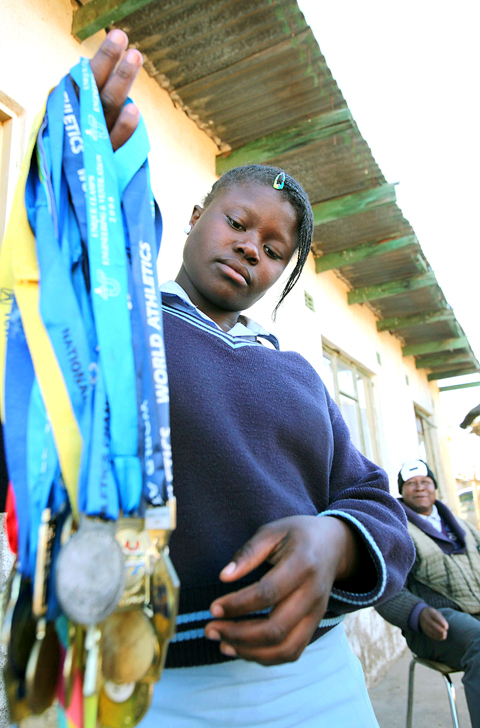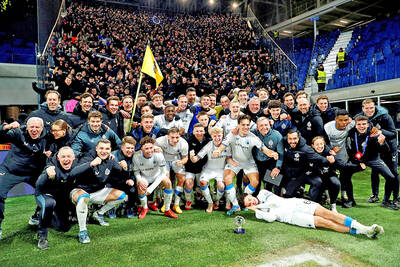She wore pants instead of a skirt to school, played soccer with the boys and was teased about her masculine looks.
Caster Semenya learned to ignore the taunts. She ran alone across a landscape of high grasses dotted with rocky hills.
She came almost out of nowhere to win the world championship in the 800m on Wednesday in Berlin, far and away the fastest woman on the track.

PHOTO: AP
Or was she?
Her time of 1 minute, 55.45 seconds was more than 2 seconds ahead of the second-place finisher, but now Semenya’s gender is the subject of an international investigation.
Even before Berlin, track officials were taking a closer look at the 18-year-old runner, following her performance last month at an international meet where she improved her personal bests in the 800m and 1,500m by huge margins.
Her family is outraged at suggestions that Semenya, who has a muscular build and a deep voice, isn’t a woman.
“That’s how God made her,” Semenya’s cousin, Evelyn Sekgala, told reporters. “We brought her up in a way that when people start making fun of her, she shouldn’t get upset.”
Her father, Jacob, has no doubts.
“She is my little girl. ... I raised her and I have never doubted her gender,” he told the Sowetan newspaper. “She is a woman and I can repeat that a million times.”
Her paternal grandmother, Maputhi Sekgala, told the South African daily the Times: “What can I do when they call her a man, when she’s really not a man? It is God who made her look that way.”
Muriel Mkele, 16, remembers how her sister would run for kilometers on dirt roads in this dry corner of Africa, usually alone because no one could keep up with her as she breezed past low, thorny trees.
Semenya’s former headmaster said he thought for years that she was a boy.
“She was always rough and played with the boys,” Eric Modiba, head of the Nthema Secondary School, told South Africa’s Beeld newspaper. “She liked football and she wore pants to school. She never wore a dress. It was only in grade 11 that I realized she’s a girl.”
The International Amateur Athletic Federation asked the South African Athletic Federation to conduct the gender test after Semenya burst onto the scene by posting a world-leading time of 1:56.72 in the 800m at the African junior championships in Bambous, Mauritius, on July 31. Her previous best was 2:00.58.
SEXPERTS
The test, which takes weeks to complete, requires a physical medical evaluation, and includes reports from a gynecologist, endocrinologist, psychologist, an internal medicine specialist and an expert on gender.
During the medal ceremony on Thursday in Berlin, Semenya waved to the crowd as she ascended the podium. She bowed as she received her gold medal and mouthed the words to the South African anthem.
Asked how she felt as she walked into the ceremony, Semenya smiled and said, “Good, man.”
‘AMBIGUITY’
She did not attend the medal winners’ news conference and was replaced at the dais by IAAF general secretary Pierre Weiss, who said the testing was ordered because of “ambiguity, not because we believe she is cheating.”
“We have to be very scrupulously fair and sensitive about” the issue, IAAF spokesman Nick Davies said. “It’s all very well people saying she’s a man, she looks like a man — that’s not good enough. You have to be very careful and cautious about that.”
Gender testing used to be mandatory for female athletes at the Olympics, but the screenings were dropped in 1999. One reason for the change was not all women have standard female chromosomes. In addition, there are cases of people who have ambiguous genitalia or other congenital conditions.
The most common cause of sexual ambiguity is congenital adrenal hyperplasia, an endocrine disorder where the adrenal glands produce abnormally high levels of hormones.
Semenya’s family was pleased she took up sports instead of drinking and partying like many other teenagers. A teacher got her interested in running, and her grandmother gave her money to enter races.
When she was about 13, Semenya’s parents sent her from Ga-Masehlong to the nearby village of Fairlie to help care for her grandmother. Semenya’s sister still lives in Ga-Masehlong. In the family’s concrete-walled, tin-roofed home, she retrieved a plastic shopping bag containing a tangle of ribbons and medals, most of them gold, won by her sister.
Muriel didn’t have to count when asked how many there were, firmly declaring: “39.”
Despite Semenya’s medals from local races, she is fairly new to international track and field.
Shirley Rammabi, who lives in Ga-Masehlong, said Semenya was an inspiration to young people in the village and that no one there questioned her gender even though it was unusual for a girl to be so interested in sports.
“The people from this place, they know her very well. They’ve known her since …” Rammabi broke off, putting her hand at the height of a toddler.
As questions mounted in Berlin, South Africans leapt to Semenya’s defense. The ruling African National Congress (ANC) party called on South Africans to “rally behind our golden girl.”
“We condemn the motives of those who have made it their business to question her gender due to her physique and running style. Such comments can only serve to portray women as being weak,” the ANC said in a statement.
Leonard Chuene, president of the South African federation, insisted Semenya was facing intense scrutiny because she was African.
“It would not be like that if it were some young girl from Europe,” Chuene told The Associated Prss by telephone. “If it was a white child, she would be sitting somewhere with a psychologist, but this is an African child.”
The Congress of South African Trade Unions said it “rejects with contempt the attempts by those who tried to undermine her success by raising bogus and groundless queries about her gender.”
‘REMARKABLE’
Gideon Sam, the president of South Africa’s Olympic governing body, congratulated Semenya on a “truly remarkable achievement.”
“We condemn the way she was linked with such media speculation and allegation, especially on a day she ran in the final of her first major world event,” Sam said. “It’s the biggest day of her life.”
Morris Gilbert, a media consultant for TuksSport, the University of Pretoria’s sports department, said the issue of Semenya’s gender was never raised at the school, where she was a freshman studying sports science.
“We are all very proud of her and of what she’s achieved,” Gilbert said. “The university stands behind her all the way.”
He attributed her 800m victory to hard work and rigorous training.
“She trains a lot,” Gilbert said. “If you go to the athletics track, you’re sure to find her there.”

Taiwan kept its hopes of advancing to the 2026 World Baseball Classic (WBC) alive with a 9-1 victory over South Africa in a qualifier at the Taipei Dome last night, backed by solid pitching. Bouncing back from Friday’s struggles on the mound, when Taiwanese pitchers surrendered 15 runs to Spain, Team Taiwan kept the visiting team in check, allowing just one run in the bottom of the fourth inning. The win was crucial for Taiwan, as a loss would have eliminated the team from contention for the next WBC. Starting pitcher Sha Tzu-chen (沙子宸) struck out one and allowed no hits, except for

The Chinese Professional Baseball League (CPBL) is considering reducing its pitch clock by two seconds to help players better adjust to the rules applied at the World Baseball Classic (WBC). The proposal aims to shorten the pitch timer from 25 seconds to 23 seconds with the bases empty, and from 20 seconds to 18 seconds with runners on base. Currently, the WBC mandates that pitchers deliver a pitch every 18 seconds with the bases empty and 15 seconds with runners on base. The issue was raised during a pre-season CPBL managers’ meeting on Tuesday by Rakuten Monkeys bench and batting

‘SETTING THE TONE’: Donovan Mitchell said that their determination to dominate had nothing to do with past results, but was about a potential post-season clash The Cleveland Cavaliers on Friday boosted their NBA-best record with a 142-105 romp past the New York Knicks, tightening their grip on the Eastern Conference lead with an all-around dominant display. Donovan Mitchell scored 27 points to lead six Cavs players to score in double figures, connecting on five of seven three-pointers as Cleveland drilled 19 from beyond the arc. “I think the biggest thing was just try to set the tone early,” Mitchell said, adding that the determination to dominate had nothing to do with the Knicks’ first-round playoff win over the Cavs two seasons ago and everything to do with

BELGIANS ADVANCE: Club Brugge gave Atalanta a lesson in efficiency, as Gian Piero Gasperini’s team had 29 efforts at goal, compared with seven from the visitors Seldom has a player’s sending off had such an influence on a game. AC Milan was to left rue Theo Hernandez’s second yellow card — for diving — as Feyenoord advanced to the UEFA Champions League last 16 at the former European champion’s expense with a 1-1 draw in the second leg of their playoff on Tuesday, giving the Dutch team a 2-1 win on aggregate. Bayern Munich, Club Brugge and Benfica also won their playoffs, eliminating Celtic, UEFA Europa League winner Atalanta BC and French team AS Monaco respectively. “In soccer everything changes in a second,” said Milan forward